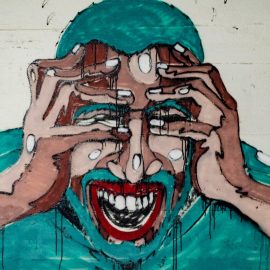
Are you anxious when the situation doesn’t call for it? Do you always expect the worst to happen? Is your stress level high?
According to Dr. Amen, anxiety doesn’t have to be part of your life. In his book Change Your Brain, Change Your Life, he shares several recommendations. Some of these require professional intervention, but you can do a few on your own.
Read more to learn how to heal the parts of your brain that generate anxiety.
Dr. Amen on Anxiety
Psychiatrist and brain health expert Daniel G. Amen emphasizes that effective treatment plans require a holistic approach that addresses biological, psychological, social, and spiritual factors. He explains that these four factors interdependently influence your overall health—and, by extension, your brain health and function. For example, lack of sleep (biological) can alter your brain chemistry and cause anxiety (psychological), leading to social withdrawal (social) and a diminished sense of purpose (spiritual).
According to Dr. Amen, anxiety might be caused by basal ganglia dysfunction. The basal ganglia in your brain modulate your reactions and behaviors. For example, when you jump with excitement at good news, or your hands tremble in nervous anticipation, it’s your basal ganglia integrating your feelings and movements. If you constantly feel anxious and nervous, predicting the worst in every situation, your basal ganglia might be damaged.
(Shortform note: While anxiety can indicate basal ganglia dysfunction, health experts suggest that heightened anxiety might stem from substance abuse or withdrawal, panic disorders, or specific phobias, such as agoraphobia or claustrophobia. Investigating these factors may help ensure accurate diagnoses and treatments.)
Anxiety Remedies
Amen recommends the following treatments and strategies for repairing and optimizing your brain health in a way that minimizes anxiety.
Heart rate variability (HRV) training: Enhancing the beat-to-beat variation in heart rhythm, achieved through techniques like controlled breathing, helps increase the time interval between consecutive heartbeats. This lowers stress levels, improving the basal ganglia’s ability to maintain emotional stability and fine-tune physical movements.
Deep diaphragmatic breathing: Taking slow, deep breaths (inhaling for five seconds, holding in for two, exhaling for five, and holding out for two) improves oxygenation and removes waste products from your brain, enhancing basal ganglia function.
Hand warming visualization: Imagining activities that warm your hands, such as sitting by a warm fire, physically increases hand temperature. This induces a relaxed state that lowers blood pressure, promoting optimal basal ganglia function.
Eye movement desensitization and reprocessing (EMDR): Guiding eye movements to process traumatic memories and reduce their emotional impact helps the basal ganglia maintain emotional balance. This treatment typically requires a trained professional to lead you through the process.
Cranial electric stimulation (CES): Unlike the previous treatments, CES is recommended by Amen for addressing limbic system dysfunction rather than basal ganglia dysfunction. Applying low electrical currents to enhance mood and improve emotional regulation can potentially influence limbic system functioning. (Shortform note: This noninvasive, FDA-approved treatment for insomnia, depression, and anxiety involves actively applying a low-intensity current to the earlobes or scalp. While the exact mechanisms of CES aren’t yet fully understood, research suggests that the electrical current alters brain activity, deactivating certain areas of the cortex and altering connections within the default mode network.)






